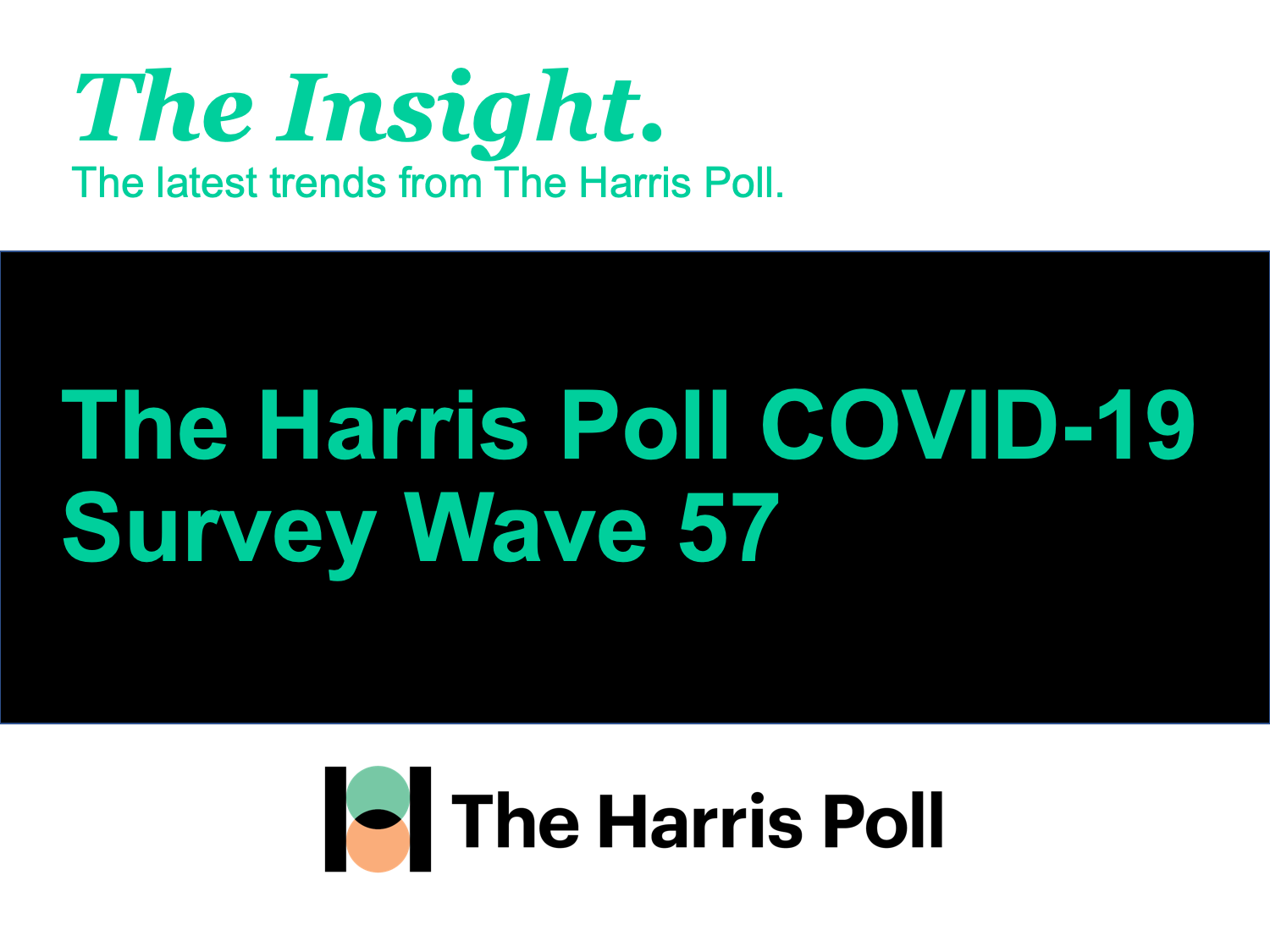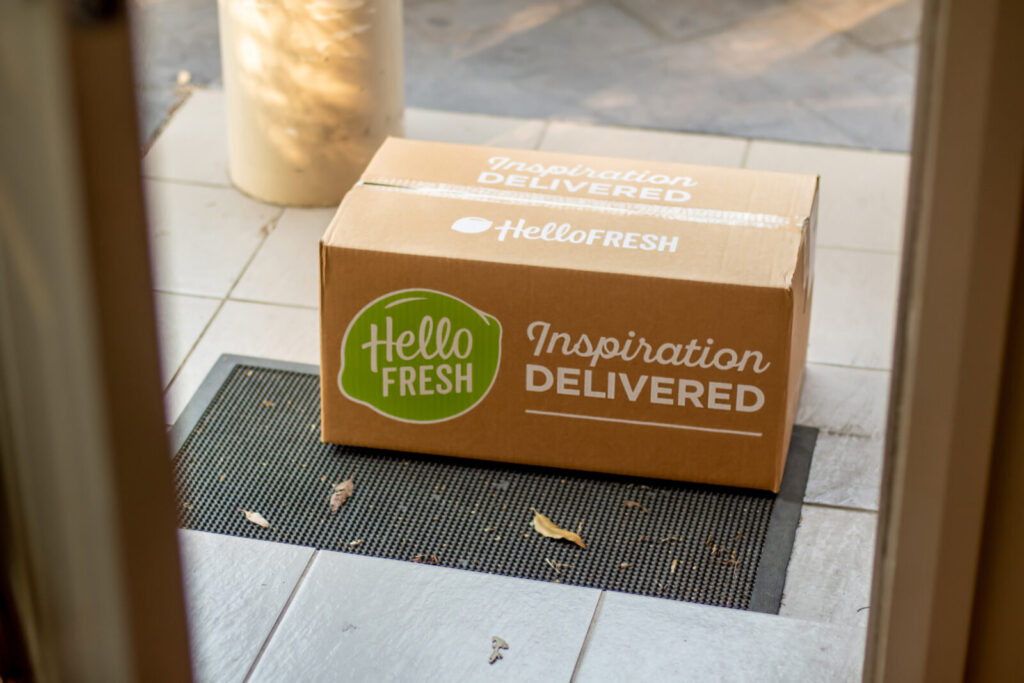Brief • 4 min Read

In The Harris Poll COVID-19 Tracker (Week 57) fielded March 26th to 28th, 2021 among 1,989 U.S. adults, we check in with Americans on their growing optimism while remaining cautious, public concern over rising Asian-American discrimination, how Older Millennials feel about their lives as they approach adulthood, what brands need to know about encouraging consumers to take a COVID-19 vaccine, and the return to in-person shopping post-pandemic.
As a public service, our team has curated key insights to help leaders navigate COVID-19. Full survey results, tables, and weekly summaries can be accessed for free at The Harris Poll COVID-19 Portal. We will continue to actively field on a regular cadence to track the shifts in sentiment and behaviors as the news and guidelines evolve.
COVID Outlook – A Trended Update
American outlook on COVID is becoming more optimistic with (62%) saying “the worst of COVID is behind us” today (vs 33% on December 30, 2020). Here’s what else is shifting across our year’s worth of survey tracking data:
- Approval of the vaccine roll out is at an all time high of (74%) up from (52%) when we first started tracking this sentiment on January 10th, as is likelihood to take the vaccine (75%) up from the lowest point of (54%) on October 24, 2020.
- Fear returning to public activity is down 5 percentage points this week to (65%), marking a gradual decline since an all time high of (76%) on July 19, 2020. Meanwhile the desire to return to normal is on the rise: (50%) miss traveling on an airplane (up from 24% on March 30, 2020).
- While optimism is rising, roughly 25% to 30% would wait until the nation reaches herd immunity to return to once normal activities such as eating indoors (23%), traveling on an airplane (27%), and attending a concert/sporting event (32%) as featured in USA Today.
Takeaway: “The vaccine is certainly a game changer for getting back to doing the things we love, said John Gerzema, CEO of The Harris Poll. “But while it’s important that we each get our own shots, a significant number of Americans are patiently waiting for their friends and neighbors to get vaccinated before we truly see a return to normal.”
The Atlanta Mass Shootings…We Saw This Coming
For the past year, The Harris Poll has been tracking awareness and concern about the surge in hate crimes against Asian Americans, and today our data finally shows a shift in public awareness and concern.
- Over two thirds (67%) of the public and (74%) of of Asian Americans believe that the Atlanta shootings were a turning point in the conversation around discrimination towards Asian Americans.
- Rise in Concern: Last year, less than 6 in 10 (59%) of Americans were concerned about the hate towards Asian Americans related to the pandemic. Now, over three quarters (76%) are concerned, including (82%) of Asian Americans.
- A Community in Pain: Nearly 7 in 10 Asian Americans (69%) are worried about their family being physically or verbally attacked due to the anti-Asian hate and nearly 3 in 10 (29%) mentioned they would be less vocal because of fear.
- A Community That Will Not be Silenced: Two-thirds (64%) of Asian Americans said the recent attacks have made them want to become more vocal against racism and (65%) stated they needed to organize protests to bring more awareness to these injustices to racial minorities. Last weekend the AAPI community along with Americans of all races and colors participated in rallies across the U.S. to condemn attacks against Asian Americans and Pacific Islanders.
- In a separate poll we conducted with the National Asian Pacific American Women’s Forum (NAPAWF), we look at details how Asian American/Pacific Islander (AAPI) women have been significantly affected by anti-Asian racism and xenophobia in the United States in a survey conducted before the tragedy in Atlanta.
Takeaway: We will be looking deeper into this divide in our nation as part of our #washthehate series in the COVID-19 Tracker.
Meet the Middle-Aged Millennial: Homeowner, Debt-Burdened and Turning 40: CNBC-Harris Poll
We teamed up with CNBC Make It to launch “Middle-Aged Millennials,” to explore how the oldest members of this generation have grown into adulthood amidst the backdrop of the Great Recession and the Covid-19 pandemic, student loans, stagnant wages, and rising costs of living. In the first part of this series, we look at homeownership among this age cohort:
- Homeownership didn’t come easily: Many Older Millennials had to get creative when paying for their home. About (10%) took out a loan from their retirement accounts, while roughly (20%) used a credit card to help. Nearly 1 in 5 also received help from their parents or other family members.
- Although most Older Millennials have managed to become homeowners, (28%) still rent and (12%) are living with their parents or other family members. Homeownership rates among Black and Hispanic Older Millennials lag their White counterparts, as do rates among those without a college degree.
- Debt has been a key factor hindering homeownership: (17%) of older millennials who don’t own a home say student loans present a barrier to homeownership. And half of older millennials say they’re not homeowners because they don’t have enough saved.

Takeaway: “When it comes to achieving homeownership, older millennials were just scrappy and very resourceful,” says Harris Poll CEO John Gerzema.
Should Brands Be Encouraging Covid-19 Vaccinations? Most Consumers Think Yes: Adweek-Harris Poll
In a new Harris Poll/Adweek survey, we looked at the role brands can play in building confidence in COVID-19 vaccinations and the opportunities it can prevent for brands:
- Consumers want brands to speak up: (60%) agreed brands have an “obligation” to encourage people to get vaccinated, while (70%) said they support brands sharing factual information about how and where to get vaccines.
- In addition, (62%) believe brands have an obligation to go beyond information dissemination itself to dispel myths around COVID-19 vaccines.
- The donut does help: (70%) of consumers think brand rewards like Krispy Kreme’s could work to encourage more vaccinations. And it’s not just shots: 60% of respondents said they’d be more likely to buy from a brand that offers promotions to encourage vaccinations.
- Boomer Opportunity: While a majority (58%) said they trust brands more than they trust social media when it comes to vaccination information, there is a wide generational divide: (73%) of Boomers said they trust brands over social media, compared to (63%) of Gen X, (44%) of Millennials and (37%) of Gen Z.
Takeaway: Using brand equity to build confidence in the vaccines could be a brand building opportunity: (42%) said a brand sharing information about vaccinations would bolster their views of the brand, while (43%) said it wouldn’t affect their opinion and just (15%) said it would lower their opinion.
Americans Will Prefer In-Person Shopping Post-Pandemic: Morning Brew-Harris Poll
We teamed up with Morning Brew to run an exclusive poll on how shopping habits have changed over the last year and found that while many did report a major shift toward digital during the pandemic, it turns out being very online isn’t for everyone:
- Over 4 in 10 (43%) said they’ll mostly shop in-person once COVID restrictions are lifted. Just (24%) said they’d mostly shop online, with (33%) saying they’d do both equally.
- (77%) of respondents are at least somewhat likely to shop at their local mall or department store.
- Less than half (47%) of respondents said they’re at least somewhat likely to use delivery apps post-pandemic. Though younger people reported a much higher willingness to keep the GrubHub and Uber Eats orders coming.
- More respondents (67%) plan to make big-ticket purchases IRL versus online (54%).

Takeaway: It’s obvious that e-comm will remain a bigger part of everyday shopping than before. But Americans want to return to the physical realm too.
Subscribe for more Insights
Subscribe to our newsletter for the latest trends in business, politics, culture, and more.
Download the Data
This survey was conducted online within the U.S. by The Harris Poll from March 26 to 28, among a nationally representative sample of 1,989 U.S. adults.
Download
Subscribe for more Insights
Subscribe to our newsletter for the latest trends in business, politics, culture, and more.
Download the Data
This survey was conducted online within the U.S. by The Harris Poll from March 26 to 28, among a nationally representative sample of 1,989 U.S. adults.
DownloadRelated Content








